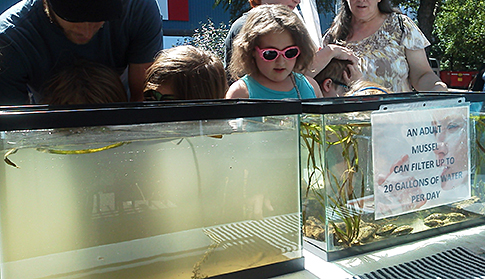
Families check out how freshwater mussels filter water at temporary exhibit by the PDE. Soon, the Water Works will have a 530-square-foot mussel hatchery. Photo Credit: PDE.
Some of the most intriguing animals in our rivers also happen to be some of the most inconspicuous creatures out there. In fact, these little guys can be nearly invisible if you don’t know what you’re looking for.
But the reality is that freshwater mussels live extraordinary lives burrowed into the beds of our local creeks and rivers.
Now, The Pew Center for Arts & Heritage is bringing their secret lives to the surface with a $300,000 grant that will fund the creation of a mussel hatchery right at the Fairmount Water Works.
Celebrating their 10th year of grant making in Philadelphia, the Center announced its 2015 recipients on June 16. We at Philadelphia Water are thrilled to see the Water Works counted among our region’s exemplary artists and cultural institutions and look forward to the expanded environmental education efforts made possible through this grant.
The Rivers Restoration Project: A Freshwater Mussel Hatchery will be an interpretive, multi-media installation that will combine science, history, and design in the creation of a site-specific, 530-square-foot living freshwater mussel enclave that will inspire visitors to discover and connect with the Schuylkill River’s rich habitat while developing an appreciation for the importance of environmental protection.
The two-year grant process is expected to allow the Water Works to open the hatchery in late 2016.
If you’re wondering why the Center and the Water Works are investing in a mussel hatchery, read on.
To the untrained eye, these little shellfish—ranked among the most imperiled animals in the United States—may look just like a leaf lying on the sandy bottom of the Schuylkill or Delaware. But tucked inside that shell is an organism that can live for a century, providing our waterways with decades of invaluable filtration and stream/riverbed stabilization that makes water healthier for both wildlife and humans.
The lifespan and habitat of our native mussels varies depending on the species, but they can live by the millions in vast colonies along riverbeds. With each one filtering up to 20 gallons of water every day, these organisms collectively form nature’s equivalent of water treatment plants, removing pollution and harmful pathogens.
Sadly, these amazing little workhorses have suffered in a big way due to a number of human factors, including unmitigated stormwater runoff and dams, which block their reproductive cycle. This widespread habitat degradation has left many stretches of local waterways without mussel beds, which can lead to destabilized banks and streambeds and water that takes much longer to clear up after disturbance from storms and other heavy sediment events.
In recent years, Philadelphia Water has partnered with the Partnership for the Delaware Estuary (PDE) to survey our local waters for mussel populations. With additional help from groups like the Tookany/Tacony-Frankford Watershed Partnership, PDE even began “reseeding” some Philly creeks with mussels, bringing them back to those areas for the first time in decades.
The Water Works hatchery is the first project of its kind in the region, and could help fuel interest in a much larger commercial hatchery that would work to filter our water (reducing the workload at treatment plants) while providing young mussels for future regional reseeding efforts, said PDE's Danielle Kreeger.
With this extremely generous $300,000 Pew grant, the Water Works will begin working on the hatchery with PDE and the Academy of Natural Sciences of Drexel University next month, bringing visitors a unique exhibit that will enrich the already impressive mix of education opportunities.
“Our 2015 grantees exemplify the diverse and dynamic cultural life of our region,” said Paula Marincola, the Center’s executive director. “As we reflect on the past 10 years of grantmaking in this vibrant community, we also look forward to the extraordinary cultural experiences this talented and ambitious group of artists and organizations will bring to Greater Philadelphia’s audiences.”
For more on educational opportunities at the Fairmount Water Works, which is celebrating its 200th birthday this year, check out their website.
You can see the full list of the amazing projects awarded 2015 grants from The Pew Center for Arts & Heritage here.